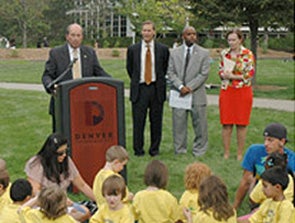New partnership of leaders in education, business launched
With the Auraria Campus as a backdrop, Denver Mayor Michael Hancock recently announced the Denver Education Compact, aimed at enhancing and improving education. Hancock is an alumus of the University of Colorado Denver School of Public Affairs.
At the Aug. 25 news conference, Chancellor Jerry Wartgow introduced the mayor. A well-known education leader and advocate himself, Wartgow highlighted the university’s work in the area of P-20, or preschool through college, and he acknowledged other highly respected business and education leaders who attended as a show of support. Among those attending were Joe Blake, Colorado State University System chancellor; Dan Ritchie, businessman and chancellor emeritus University of Denver; Community College of Denver Interim President Cliff Richardson; Anna Jo Haynes, a 40-year veteran of Mile High Montessori Early Learning Centers; and a group of children from the Auraria Early Learning Center.
Hancock named Denver Public Schools (DPS) Superintendent Tom Boasberg, and Kaiser Foundation Health Plan Colorado President Donna Lynne, to co-chair the Compact (photo above Chancellor Wartgow at podium, l to r, Boasberg, Mayor Hancock and Lynne).
Education advocate Theresa Pena will become executive director of the compact when her second and final term on the DPS School Board ends in November. Until then, University of Colorado Denver’s Janet Lopez, director of P-20 Education Initiatives will help launch the compact and serve as the interim-executive director.
The Denver Education Compact is a cradle-to-career effort that will focus the action and resources of all stakeholders on areas that will make the biggest differences in children’s futures. Members of the compact will come from the private, public and nonprofit sectors to drive collaboration between the city, Denver Public Schools, higher education, business, foundation and civic leaders in order to evaluate needs, develop strategies and implement an agenda to improve outcomes for children.
In his remarks about the task ahead, Hancock referenced Martin Luther King’s philosophy regarding how we are measured by our actions in times of challenge and controversy. For Denver, Hancock sees “a city where every child has an opportunity to live up to their potential.” Actions that will have the greatest impact for helping Denver children to succeed must be the focus of the Education Compact, Hancock said.
Hancock pointed to similar efforts in cities such as Boston, Cincinnati, Los Angeles and Seattle, where results are measureable. He said the Denver Education Compact will draw on the opportunities and challenges from all these efforts to build a plan that fits Denver’s needs.
The first act of the leadership team will be to appoint a board of stakeholders. Then the board will set common goals and establish metrics that will be used to measure and monitor progress. Next, the board will determine the best approaches to achieve progress. Compact members will make specific commitments outlining how they will help reach these goals. Finally, the compact will report clear measures of progress each year and adjust strategies based on the results.


